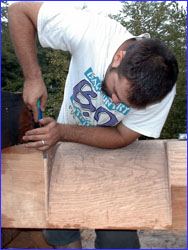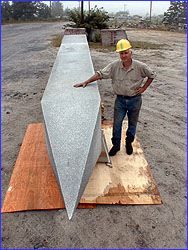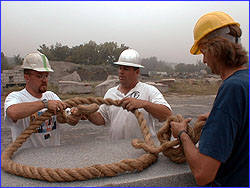
|
 |
 |
by Peter Tyson August 27, 1999 When we left you in Egypt five months ago, we claimed a "strengthened resolve" to ultimately succeed in raising an obelisk (see Angle of Repose). Well, we're back, and if all goes to plan, on September 11, a spanking new, 25-ton granite obelisk will stand upright at last. It will do so not in Aswan, alas, but in a quarry in Massachusetts, for we decided for logistical reasons to make this third attempt a bit closer to NOVA's home base in Boston. This morning I drove out the quarry to see how things were shaping up. The first thing I saw upon entering the fog-shrouded quarry were some old friends. Rick and Wyly Brown, the father-and-son timberframers who helped us in Egypt, were back in action, with Rick running the show here. Wyly, his mother Laura, and fellow timberframer Ellen Gibson—who, like the Browns, works as a teacher and sculptor at the Massachusetts College of Art - were using chisels to shape the pivot timber, on which the obelisk will pivot on its way to verticality. These four are just part of a sizeable team that has been working for months to get ready. "We're a really cohesive group," Rick told me as we threaded our way through heaps of granite blocks. "All of us have a passion for building, and we work well together, sharing ideas. It's not an ego thing, with someone walking away feeling someone else didn't use his idea."
As Rick showed me around, I came to realize that this crew was doing many things differently than the former had. Clearly some lessons were learned at Hamada Rashwan's quarry. The most obvious is the project's simpler design. Julia Cort, producer of the upcoming NOVA film "Obelisk II," opted for a version of the sandpit method that Roger Hopkins had such success with in Egypt, albeit with a much smaller stone (see A Tale of Two Obelisks). The obelisk-raising operation will begin with the 49,000-pound shaft lying horizontally on a gravel ramp, with its butt end hanging out over a concrete container filled to the brim with dry sand. (In ancient Egypt, such a container would probably have been built of thick walls of mud brick.) As team members slowly drain the sand through special doors at the bottom of the container, they will lower the obelisk into the turning groove (for a description, see Second Chance), in which it should rest at an angle of 75°. Then, weather permitting, on September 11 a huge group of pullers will yank the obelisk upright under controlled conditions. All but complete, the ramp of "crush-and-run" gravel bears a wall of giant granite blocks at its high end. The obelisk will pivot over the top of this wall into the concrete-block container, which is about half finished. (Rick dubs it the "Lego sandbox" even though each block weighs about 10 tons.) By Sunday, the container should be finished and filled with sand, ready for sand removal starting Monday or Tuesday.
There are other different aspects as well, like no 90-degree edges on which ropes could abrade. And one language only (English). And perhaps most significant, more time to prepare for the big day. This makes it easier to keep to the spirit of the operation, which calls for thinking like the ancients. "When a problem comes up, we've tried not to throw 20th-century solutions at it, but back up and think how they would do it," Rick says. "How would they treat lines? Were they capable of splicing?" About the only thing I can sense is exactly the same is the optimism. When I ask the three grommet-tiers if they think this raising will succeed, Mullen and Smith blurt out, "Oh yeah!" Kricker is only slightly more circumspect. "We think so," he said, and smiled. Watch for the next dispatch on Wednesday, September 1. Peter Tyson is Online Producer of NOVA. Obelisk Raised! (September 12) In the Groove (September 1) The Third Attempt (August 27) Angle of Repose (March 25) A Tale of Two Obelisks (March 24) Rising Toward the Sun (March 23) Into Position (March 22) On an Anthill in Aswan (March 21) Ready to Go (March 20) Gifts of the River (March 19) By Camel to a Lost Obelisk (March 18) The Unfinished Obelisk (March 16) Pulling Together (March 14) Balloon Flight Over Ancient Thebes (March 12) The Queen Who Would Be King (March 10) Rock of Ages (March 8) The Solar Barque (March 6) Coughing Up an Obelisk (March 4) Explore Ancient Egypt | Raising the Obelisk | Meet the Team Dispatches | Pyramids | E-Mail | Resources Classroom Resources | Site Map | Mysteries of the Nile Home Editor's Picks | Previous Sites | Join Us/E-mail | TV/Web Schedule About NOVA | Teachers | Site Map | Shop | Jobs | Search | To print PBS Online | NOVA Online | WGBH © | Updated November 2000 |
 Wyly Brown chisels down an edge on the pivot timber
at the quarry.
Wyly Brown chisels down an edge on the pivot timber
at the quarry.
 Will the newly fashioned obelisk stand upright in
September? Rick Brown, project leader, is at the
forefront of those who dearly hope so.
Will the newly fashioned obelisk stand upright in
September? Rick Brown, project leader, is at the
forefront of those who dearly hope so.
 From left to right, Andy Smith, Grigg Mullen, and Jim
Kricker tie a grommet onto the obelisk using heavy
Manila hemp.
From left to right, Andy Smith, Grigg Mullen, and Jim
Kricker tie a grommet onto the obelisk using heavy
Manila hemp.